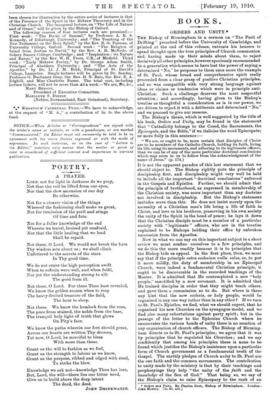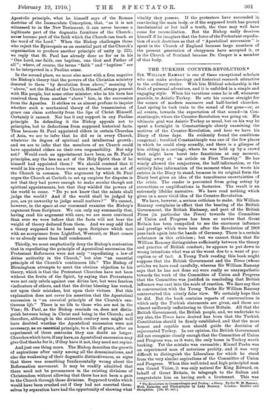BOOKS.
ORDERS AND UNITY.* THE Bishop of Birmingham in a sermon on " The Peril of Drifting" preached before the University of Cambridge, and printed at the end of this volume, entreats his hearers tc
spend thought upon the true principles of Church communion, and, having made up their minds about them, to reject decisively all other principles, however speciously recommended.
In a generation which seems to have lost the power of saying a determined "No," he proposes to them once more the example of St. Paul, whose broad and comprehensive spirit really proceeded from a clear grasp of positive Christian principles,
and so was compatible with very strong language against ideas or claims or tendencies which were in principle anti- Christian. Such a challenge deserves the most respectful attention ; and accordingly, having given to the Bishop's treatise as thoughtful a consideration as is in our power, we are driven to reject it with a deliberate and determined " No," and we proceed to give our reasons.
The Bishop's thesis, which is well suggested by the title of his book, Orders and Unity, may be found in the statement that " Catholicity belongs to the Creed, the Sacraments, the Episcopate, and the Bible," if we italicise the word Episcopate; or more fully in this sentence :—
" We are, or ought to be, more certain that disciples of Christ are to be members of the Catholic Church, holding its faith, living its life, using its sacraments, and adhering to its legitimate officers, than we can be of any of the more particular doctrinal conclusions which may seem to us to follow from the acknowledgment of the name of Jesus." (p. 174.) It is not the apparent paradox of this last statement that we should object to. The Bishop rightly puts the principle of discipleship first, and discipleship might very well be held to include all the important " doctrinal conclusions " enforced
in the Gospels and Epistles. Further, we should admit that the principle of brotherhood, as expressed in membership of the Christian society, was more important than any doctrine not involved in discipleship. But the Bishop's statement includes more than this. He does not insist merely upon the necessity of a, Christian man's life being a life of faith in Christ, and love to his brethren, preserving in his own society the unity of the Spirit in the bond of peace; he lays it down that the Christian disciple must be a member of a particular society with " legitimate " officers, who are in the treatise explained to be Bishops holding their office by unbroken succession from the Apostles.
Now in what we can say on this important subject in a short review we must confine ourselves to a few principles, and we do this the more readily because it is to principles that
the Bishop bids us appeal. In the first place, then, we must say that if the principle extra ecclesiarn nulls salus, or, to put it more mildly, the duty of membership in an Episcopal Church, were indeed a fundamental Christian principle, it ought to be discoverable in the recorded teachings of the- Master. It is admitted that He contemplated a new "holy people," sanctified by a new covenant. It is admitted that
He trained disciples in order that they might teach others, and gave them a commission so to do. But where is there any hint that the new ecclesia, or holy people, would be organised in any one way rather than in any other? If we turn
to St. Paul's Epistles, we find, what we should expect, that he organised his new Churches on the synagogue model, and we find also many exhortations against party spirit; but in the passage of the letter to the Ephesian Church where he
enumerates the various bonds of unity there is no mention of any organisation of church officers. The Bishop of Birming- ham directs us to St. Paul's principles; we agree that it was by principles that he regulated his Churches ; and we say confidently that among his principles there is none to be found which justifies the Bishop's insistence upon a particular, form of Church government as a fundamental truth of the Gospel. The earthly pledges of Church unity to St. Paul are the one faith and the common sacraments. The contribution to unity made by the ministry is that by their teachings and prophesyings they help " the unity of the faith and the knowledge of the Son of God." That being so, we say of the Bishop's claim to raise Episcopacy to the rank of an
• Orders and Unity. By Charles Gore, Bishop of Birmingham. London : John Murray. (3s. 6d. net.)
Apostolic principle, what he himself says of the Roman doctrine of the Immaculate Conception, that, " as it is not witnessed to in the New Testament, it can never become a legitimate part of the dogmatic furniture of the Church ; never become part of the faith which the Church can teach as the word of the Lord." When the Bishop challenges those who reject the Episcopate as an essential part of the Church's organisation to produce another principle of unity (p. 225), we reply that St. Paul has already done so for us in his " One Lord, one faith, one baptism, one God and Father of all "; where, of course, the terms " faith " and " baptism " are to be interpreted in a Pauline sense.
In the second place, we must also meet with a firm negative the Bishop's theory that the powers of the Christian ministry descend to them " by devolution from above," meaning by " above," not the Head of the Church Himself, always present with His people, but some other minister, who in his turn has received them from another " above" him, in the succession from the Apostles. It strikes us as almost profane to inquire whether such a mechanical theory of the transmission of grace can claim authority from the lips of Christ Himself. Certainly it cannot. Nor has it any support in any Pauline principle. In defending it the Bishop appeals not to principles, but to deductions from supposed historical facts. Thus because St. Paul appointed elders in certain Churches of Asia, we are to infer that he did so in every Church, whatever its degree of spiritual and intellectual growth; and we are to infer that the members of no Church could have appointed elders on their own responsibility. But why not? Would such an appointment have been, on St. Paul's principles, any the less an act of the Holy Spirit than if he himself had appointed them ? We should contend that it would in his eyes have been even more so, because an act of the Church in common. The argument by which St. Paul urges the Church at Corinth to set up umpires for disputes is not that they had power enough to make secular though not spiritual appointments, but that they wielded the powers of the world to come. " Do ye not know that the saints shall judge the world ? And if the world shall be judged by you, are ye unworthy to judge small matters ? " We cannot, however, in the space at our command examine the Bishop's argument from Scripture. We can only say summarily that, having read his argument with care, we are more convinced than ever we were before that the facts will not bear the weight of theory deduced from them. And we may add that a theory supposed to be based upon Scripture which met with no acceptance from Lightfoot, Westcott, or Hort comes to us already more than half condemned.
Thirdly, we must emphatically deny the Bishop's contention that in repudiating the principle of Apostolical succession the Protestant Reformers were not only " repudiating a law of divine authority in the Church," but also "an essential principle of the Church's continuous life." The Bishop of Birmingham attempts to meet the obvious objection to his theory, which is that the Protestant Churches have not been without the fruits of the Spirit, by saying that Protestants were not only rebels against one divine law, but were fearless vindicators of others, and that the divine blessing has rested, not upon their mistakes, but upon their virtues. But this explanation does not cover his assertion that the Apostolical succession is " an essential principle of the Church's con- tinuous life." There is no life to those who are not in the Vine; St. Paul, as the Bishop reminds us, does not distin- guish between being in Christ and being in the Church; and therefore, although in the sixteenth century men might well have doubted whether the Apostolical succession were not necessary, as an essential principle, to a life of grace, after an experiment of three centuries they can doubt no longer. Churches which have, if any have, an Apostolical succession may give God thanks for it; if they have it not, they need not repine.
Andjust one thing more. The Bishop describes the growth of aspirations after unity among all the denominations, and also the weakening of their dogmatic distinctiveness, as signs that there was something fundamentally wrong about the Reformation movement. It may be readily admitted that there need not be permanence in the existing divisions of Christendom without allowing that there has not been a gain to the Church through those divisions. Supposed truths which would have been crushed out if they had not asserted them- selves by separation have had the opportunity of showing what
vitality they possess. If the protesters have succeeded in. convincing the main body, or if the supposed truth has proved insubstantial or but half a truth, the time may well have come for reconciliation. But the Bishop sadly deceives himself if he imagines that the force of the Protestant repudia- tion of such doctrines as that of " Apostolical succession " is spent in the Church of England because large numbers of the present generation of clergymen have accepted it, or in the Church of Scotland because Dr. Cooper is a member of that body.









































 Previous page
Previous page